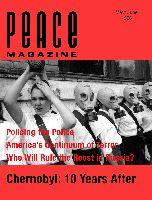
Peace Magazine May-June 1996, page 5. Some rights reserved.
Search for other articles by various here
Canada has just rescued the efforts of the international community to help Haiti maintain its foothold on the rocky path to democracy. It was estimated that 1,900 peacekeepers were needed to quell the chaotic violence in that unhappy country. The United Nations Security Council would authorize only 1,200. Why? Money problems again? No. The problem was that China was annoyed with the other permanent members of the Security Council over their relationships with Taiwan and was said to be choosing the Haiti issue to block appropriate U.N. action. It could do this because each of the "permanent five" (or "Perm-5") has the power to veto any Security Council decision. Canada, through Minister for Foreign Affairs Lloyd Axworthy, came to the rescue by offering to pay for the remaining 700 peacekeepers. The operation is now moving into place.
When the U.N. was set up in 1945, the Security Council was formed to provide a body which could react more rapidly to threats to international security than could the huge General Assembly. Somehow, the so-called "great powers" of the post-war period - Britain, France,United States, China and the Soviet Union - wangled veto power for each of them, enabling each, single-handedly, to block any Security Council proposal. The remainder of the Security Council comprised rotating members from all the other U.N. nations, and acted as a democratic group where a majority prevailed if none of the Perm-5 was using the veto power.
During the succeeding Cold War years, the Security Council was paralyzed by repeated deadlocks between the U.S. and the Soviet Union. Opportunities for constructive action came and went while the two behemoths remained with horns locked. Some had foreseen this problem from the beginning and had warned against it. Now we remain with a dysfunctional system. It never has worked well, it never can, because it is a grossly unjust distribution of decision-making power. Those same Perm-5, strange to say, are the very countries who built nuclear arsenals in the post-Cold War period. They dominate the Security Council with excessive power, and they cast a malevolent shadow over global security with mega-death devices. This state of affairs has negative effects on U.N. credibility throughout theworld.
The Canadian government cleverly circumvented the Chinese veto, but only at the cost of paying for the peacekeepers. It is time that the era of Perm-5 veto power must go. Those with power will not surrender it willingly. To quell criticism, they may grudgingly offer to share it with one of a few other rich or populous nations. It will probably take years of persistence and an eye for the right opportunity to correct this very large mistake. Write to Lloyd Axworthy and stay vigilant.
Joanna Santa Barbara, Hamilton, Ontario
Promoting hatred is an evil act, without doubt, but what if truth promotes hatred? Presumably freedom of speech implies the freedom to tell the truth, no matter how strange or comfortless it may be. Unfortunately, peace of mind doesn't always reflect a sense of justice. Should we be preventing hatred to the extent that no one can investigate history nor discover new facts? After all, the upcoming Balkan war crime trials may arouse more hatred than gratitude.
Eradicating hate implies universal love. How is that possible if society is complacent about everything except the status quo? How can we love one another if injustice gets in our way? Sometimes one man's honor is another man's fabrication. Imagine all the hatred we could avert if there were no pride to defend.
L.S. Cattarine, Toronto, Ontario

Peace Magazine May-June 1996, page 5. Some rights reserved.
Search for other articles by various here